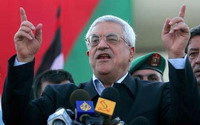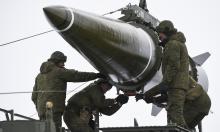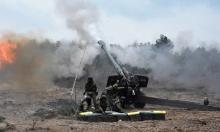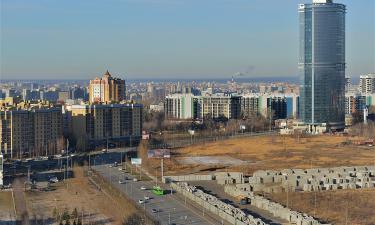Ehud Olmert and Mahmoud Abbas work at peace deal to be presented at peace conference
Israeli Prime Minister Ehud Olmert and Palestinian President Mahmoud Abbas try to formulate a joint vision of a peace deal to be presented at a November peace conference.

However, the two sides are far apart on how specific the joint document should be, underscoring the conflicting expectations and the considerable potential for failure. The Palestinians want to take a detailed framework agreement to the conference, while Israel wants a shorter and vaguer statement.
"From now and until mid-November, the agenda should be clearly set out," Abbas said Sunday in Cairo, Egypt. "More than 36 countries will attend the conference and this big gathering requires us to go there with a definite document to pave the way later for the detailed negotiations (for) the final settlement."
Israeli officials have said the conference would at best point negotiators in the right direction, but not yield solutions to the "core" issues, such as division of the disputed city of Jerusalem and future borders.
Separately, Palestinian officials were drafting their own proposed outline of a peace deal which was being circulated among Palestinian leaders for comment. According to a copy obtained by The Associated Press, the Palestinians are ready to swap some land with Israel and limit the number of Palestinian refugees returning to their homes in the Jewish state, but also demand the return of all areas of Jerusalem captured by Israel in the 1967 Mideast war.
The draft sets several deadlines. After the signing of a framework agreement, a final peace deal should be reached within 13 months and all Israeli settlers should leave Palestinian territory within three years.
Israel is likely to object to such a timeline and the proposed division of Jerusalem.
Palestinian negotiator Saeb Erekat denied the existence of a Palestinian position paper. He also said the Palestinians will not take any documents to Wednesday's meeting between Abbas and Olmert.
Olmert's aides said he would host Abbas at his Jerusalem residence on Wednesday morning.
Initial reports had indicated the meeting would be held Tuesday, but an official in Olmert's office said it had been put back for what he said were "technical reasons."
Erekat said the two leaders would meet privately at first, and would then be joined by their teams.. "They will brief us (the teams) on what they discussed and what they expect us to do," he said.
Abbas and Olmert met five times in recent months, to sound each other out and build trust. Abbas said the talks were wide-ranging, "but until now we cannot say that we are negotiating."
The U.S. is sponsoring the peace conference, which is to take place in Annapolis, Maryland, most likely in late November. The U.S. wants the conference to lead to a resumption of peace talks, which broke down in January 2001. Washington wants key Arab states, notably Saudi Arabia, to attend and lend backbone to the meeting.
In other developments Sunday:
- Hundreds of Israelis marched to five West Bank sites to set up new settlement outposts. Many spent the night, building sukkas, after ignoring orders by Israeli troops to stay away. The Israeli authorities said the squatters would be removed from the area on Monday.
- Israel said it would release 87 Palestinian prisoners on Monday in a goodwill gesture during the Muslim fasting month of Ramadan. More than 11,000 Palestinians are held by Israel. Palestinian officials have welcomed the release, but said many more should be freed.
- Egypt allowed dozens of stranded Palestinians to return to the Gaza Strip early Sunday, in a rare sign of cooperation with Gaza's Hamas rulers. The returning Palestinians, including prominent Hamas members, had been trapped in Egypt since the Islamic militant group seized control of Gaza in mid-June. Egypt has had few dealings with Hamas since its Gaza takeover, and the Egyptian border with Gaza has been sealed.
- Hamas in Gaza renewed a cease-fire call to Israel, a possible sign of the growing pressure the Islamic group faces after months of isolation in Gaza. Israel dismissed it as a ploy; Gaza militants continue to fire rockets at Israeli border towns. Last week, Israeli Defense Minister Ehud Barak said he's moving closer to ordering a large-scale military offensive in Gaza to halt the rocket attacks.
Subscribe to Pravda.Ru Telegram channel, Facebook, RSS!




